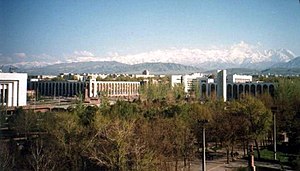As some may have noticed, my post regarding an aid project in Mongolia to reform herding and agricultural practices was characterized as snide (and short). I am very familiar with donor funded projects and know pretty well how they are designed and by whom. So, if I sound snide, I have good reasons.
But, in this case, I was mostly deriding the title of the project in its context, not necessarily its terms of reference - about which I know little. Also, as most Americans know next to nothing about their neighboring county much less another country, gave a microscopic history of the Mongols for contextual purposes. So, try not to be overly sensitive - even if it is your project.
Let's look at the numbers: Mongolia has around 2.5 million people. Between 1991 and 2000 total aid was almost US$1.9 billion. By any measure, a huge sum of money-to-population ratio ranking up there with Armenia. Funding has been growing as if nothing has been learned, because the situation is getting worse.
As I mentioned in the post, for centuries economic activity in Mongolia was based on migratory livestock breeding. Again - the numbers speak for themselves: Over 30% of the GDP from 1921 to 1990 came from Moscow in order to industrialize the country and destroy nomadism. By the mid-1950s, over 90% of the population were rural herders - by 1990 that dropped to 33%. Industrialization was a success but the true nature of economic activity in Mongolia could not be perpetually hidden.
In 1991 Mongolia had two world-class industries: copper and cashmere. Now, despite millions of dollars in international aid and the combined wisdom of hundreds of Western consultants, there is none. For example, around 1995 the World Bank, IMF and ADB forced Mongolia to lift a ban on the export of raw cashmere. China has purchased all of the raw cashmere and Mongolia’s processing industry is vaporized. This is otherwise known as globalization. You may have heard of this? Thank you donor community.
Then, the devasting effects of several severe winters and dry summers have taken their toll. Millions of animals have died this winter alone and herders are dropping further into poverty and debt and retreating to the cities. There is nothing - nothing - aid agencies can do about the effects of climate change in Mongolia; but blaming the herders appears to be easy.
One idea tossed around by the aid industry in the past is ranching. I'm willing to bet that this new project will promote ranching. I hope I am wrong, but if that is the case, then the climate, terrain and history will disabuse the consultant of pre-conceived notions quickly. The vegetation is too sparse and the climate too harsh - just for a start. Less than 1% of the land is cultivated. You think this will change? Perhaps to double it? Triple? Quadruple? Ranching is a joke.
The fact of the matter is that the herders - indulging in long held nomadic practices - rescued the Mongolian urban population from starvation during the early 1990s after the Soviet Union collapsed, inflation skyrocketed and food vanished (except for a price). But, Mongolians did not starve and the unemployed did not riot. Why? Because they returned to the kind of activity most suitable for the environment. Neither education nor employment made a major contribution to Mongolia’s economic growth, but livestock raising - nomadic style, was key to Mongolia’s quick recovery after 1995 even if its share in GDP has been declining since 1999.
The donors of today downgrade or outright ignore the salvation of the economy during that period. One merely needs to read the UNDP reports from 2001 (Keith Griffin’s Poverty Reduction in Mongolia (2001) )where he emphasizes the lowering of productivity among the herders because the animals only increased 30% while the number of people increased 183% in one decade. So what? The implication is that the alternative - for the population to sit around hungry in Ulan Bator - was better? There is a denial of reality - the reality being that a nomadic lifestyle can be viable. Furthermore, these donor agencies appear to believe that the nomadic herders would not be what they are if they had alternatives. Well, I suggest that these preconcieved notions (applied everywhere, I might add, and not just in Mongolia) be tested against research on nomadic societies. A little understanding can go a long way.
The UNDP has actually called for livestock collective farms - an absurd suggestion given the collective memory of the Soviet system.
I agree that the capacity of the pastures to absorb increases in herds must be studied and that some improvement in herding and livestock farming is always possible; but, climate change and over-grazing, although real, are not alone in adversely impacting the industry.
So, good luck with the project. Imposition of western techniques is normally resented, so I hope the project actual helps the Mongolian people and takes into consideration their history and the environment.
![Reblog this post [with Zemanta]](http://img.zemanta.com/reblog_a.png?x-id=c9923ef6-1fc3-4080-84ea-40166ff1d7af)

![Reblog this post [with Zemanta]](http://img.zemanta.com/reblog_a.png?x-id=f430094f-3f07-4e90-a287-a906c44fd275)
![Reblog this post [with Zemanta]](http://img.zemanta.com/reblog_a.png?x-id=983f6cbe-3932-4864-9960-48325892f828)
![Reblog this post [with Zemanta]](http://img.zemanta.com/reblog_a.png?x-id=4bf67bfa-1208-43bc-8eb2-3950dfd71377)
![Reblog this post [with Zemanta]](http://img.zemanta.com/reblog_a.png?x-id=44f1a67d-0625-4f39-a119-10c7cdf7e344)
![Reblog this post [with Zemanta]](http://img.zemanta.com/reblog_a.png?x-id=a2981f6c-0d5f-4a10-9a3b-cb8348bbf7f6)

![Reblog this post [with Zemanta]](http://img.zemanta.com/reblog_a.png?x-id=1e8ba8d0-fc03-4f82-9e2e-5dfb1c9c4bbc)




![Reblog this post [with Zemanta]](http://img.zemanta.com/reblog_a.png?x-id=5739b690-8296-47bf-8c81-ba50c2558076)
![Reblog this post [with Zemanta]](http://img.zemanta.com/reblog_a.png?x-id=1ed3bb47-436d-44c7-a279-40c89a3cc304)

![Reblog this post [with Zemanta]](http://img.zemanta.com/reblog_a.png?x-id=8a4ad6c4-a131-45c1-beba-53a6b2d97da3)

![Reblog this post [with Zemanta]](http://img.zemanta.com/reblog_a.png?x-id=784378b2-60fc-486d-a974-4bde861267e2)
![Reblog this post [with Zemanta]](http://img.zemanta.com/reblog_a.png?x-id=936631c8-cabb-470c-8fef-de9c7e239738)

![Reblog this post [with Zemanta]](http://img.zemanta.com/reblog_a.png?x-id=d699f950-9e91-4e39-9626-80760d459f73)

![Reblog this post [with Zemanta]](http://img.zemanta.com/reblog_a.png?x-id=944cc763-7d82-43a8-8d3f-d140997159c5)

![Reblog this post [with Zemanta]](http://img.zemanta.com/reblog_a.png?x-id=28678ddb-ad57-4f8c-9633-078cee19f371)